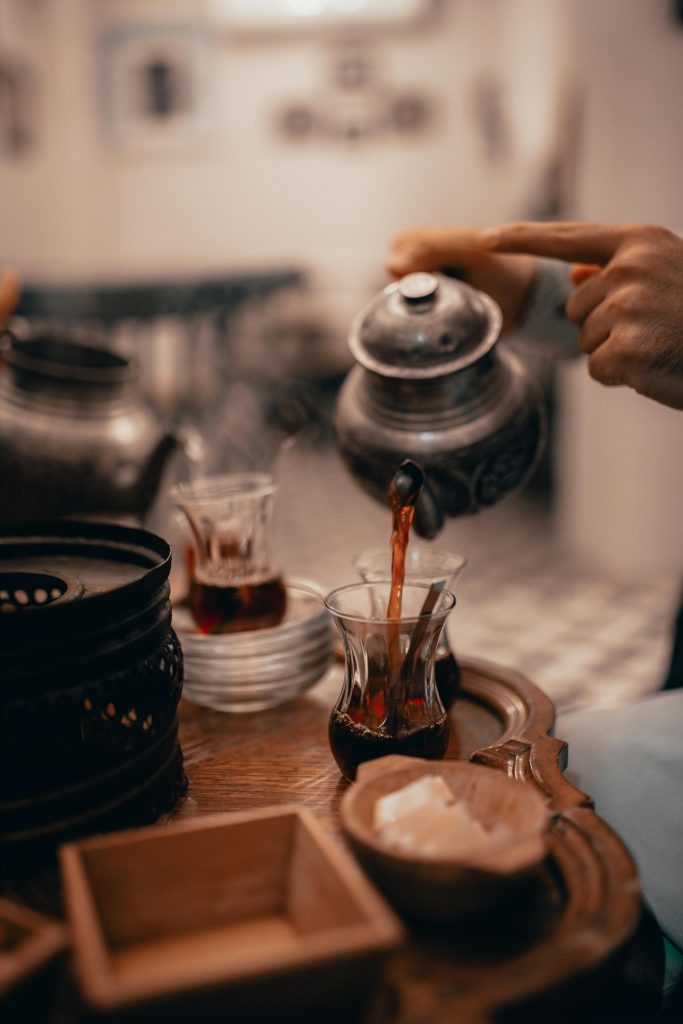In our daily lives, beverages play a crucial role. Black tea, being one of the most popular and commonly consumed drinks in the world, can be found in almost every corner. Whether at a cozy family gathering, a busy office, or an elegant café, a fragrant cup of black tea often provides a moment of tranquility and enjoyment.
Black tea is not only loved for its unique flavor but also for the wide range of potential health benefits it may offer. People often discuss the potential benefits of black tea, such as its antioxidant properties, its ability to refresh the mind, and its role in reducing cardiovascular disease risk. However, amidst the many discussions on the health benefits of black tea, one question remains contentious: Is black tea good or bad for the stomach?
The Popularity of Black Tea
Black tea originated in China and has now spread widely across the globe. From the British afternoon tea tradition to the spiced black tea of India, from China’s Lapsang Souchong to Sri Lanka’s Ceylon tea, its influence is everywhere. Whether brewed conveniently from tea bags or carefully prepared with traditional tea utensils, black tea caters to the taste preferences of different people. The variety of brands and types of black tea available on supermarket shelves is a testament to its popularity in the market.
To learn about the process of making black tea, click here.

Main Components of Black Tea
Tea Polyphenols
Tea polyphenols are one of the important components in black tea, known for their antioxidant, antibacterial, and antiviral properties. In the stomach, tea polyphenols can help remove free radicals and reduce oxidative stress damage to the gastric mucosa. They also have anti-inflammatory effects, which can help alleviate gastric inflammation. However, excessive tea polyphenols may also irritate the gastric mucosa, especially for individuals with a more sensitive gastric lining.
Caffeine
Caffeine is another notable component of black tea. It stimulates the central nervous system, helping to maintain alertness and wakefulness. For the stomach, caffeine may stimulate gastric acid secretion. Excessive gastric acid can lead to acid reflux and stomach pain, particularly for individuals with high gastric acid secretion or those suffering from gastric ulcers. However, moderate caffeine intake can also promote gastrointestinal motility, aiding in digestion and bowel movements.
Tannins
Tannins are also present in black tea. They have astringent properties, which can reduce intestinal secretions and alleviate diarrhea symptoms. However, tannins may bind with proteins in food to form indigestible complexes, increasing the digestive burden on the stomach. Excessive tannin intake can also irritate the gastric mucosa, leading to discomfort.
Other Beneficial Components (e.g., Catechins, Flavonoids)
Catechins have antioxidant, antibacterial, and antiviral properties, providing some protection to the gastric mucosa. They can enhance the resistance of the gastric mucosa and reduce external damage to the stomach. Flavonoids also have antioxidant and anti-inflammatory effects, helping to alleviate gastric inflammation and protect the gastric mucosa.
Benefits of Black Tea for Stomach Health
Promoting Digestion
Certain components in black tea can stimulate gastrointestinal motility, aiding in digestion. After consuming black tea, it can help food move more smoothly through the gastrointestinal tract, reducing the time food stays in the stomach and lowering the risk of indigestion and bloating.
Increasing Gastric Acid Secretion and Aiding Digestion
Adequate gastric acid is essential for food digestion. Black tea can stimulate gastric acid secretion to some extent, helping food to be broken down and absorbed more effectively. For instance, protein digestion requires gastric acid, and the increased gastric acid from black tea assists in the initial breakdown of proteins, setting the stage for further digestion and absorption in the small intestine.
Antioxidant Effects and Free Radical Suppression
Black tea is rich in antioxidants, such as tea polyphenols. These antioxidant components can capture and neutralize free radicals in the body, reducing damage to the gastric mucosal cells. Free radicals are highly reactive molecules that, when accumulated in excess, can cause oxidative stress, damaging cell structures and functions. By inhibiting free radicals, black tea helps maintain the integrity of the gastric mucosa and reduce the likelihood of gastric diseases.
Protecting the Gastric Mucosa
The gastric mucosa is an important barrier protecting the stomach from acid and harmful substances. Some components in black tea can protect the gastric mucosa by enhancing its resistance and reducing damage from external factors (e.g., irritant foods, alcohol). For example, catechins in black tea can promote the regeneration and repair of gastric mucosa cells, maintaining the normal structure and function of the gastric mucosa.
Anti-inflammatory Effects and Alleviating Gastric Inflammation
Gastric inflammation is a common symptom and underlying cause of many gastric diseases. Tea polyphenols and other components in black tea have significant anti-inflammatory effects. They can inhibit the production of inflammatory factors and reduce gastric inflammation. For patients with mild gastritis, moderate consumption of black tea may help alleviate gastric inflammation and improve discomfort symptoms.
Regulating Gastrointestinal Function and Relieving Gastric Cramps
Normal regulation of gastrointestinal function is crucial for stomach health. Black tea can help maintain the balance of gastrointestinal function by regulating the nervous system and endocrine functions of the gastrointestinal tract. Additionally, for some people experiencing gastric cramps due to gastrointestinal disturbances, certain components in black tea may offer relief from pain and discomfort.
Improving Gut Microbiota
Although black tea mainly affects the stomach, it also has a positive impact on gut microbiota. A healthy gut microbiota is essential for overall digestive system health. Some components in black tea can promote the growth of beneficial bacteria and inhibit the proliferation of harmful bacteria, thus improving the balance of gut microbiota. This balanced gut microbiota helps enhance digestive function, reduce negative feedback from the gut to the stomach, and indirectly support stomach health.

Potential Adverse Effects of Black Tea on Stomach Health
Excessive Gastric Acid
Certain components in black tea may stimulate gastric acid secretion. For individuals with already high gastric acid levels, excessive consumption of black tea might lead to an overproduction of gastric acid. Excess gastric acid can erode the gastric mucosa, disrupt the normal physiological environment of the stomach, and potentially lead to various gastric issues over time.
Potential to Trigger or Worsen Acid Reflux (Gastroesophageal Reflux Disease)
Acid reflux refers to the phenomenon where gastric acid flows back into the esophagus. Components such as caffeine in black tea may relax the lower esophageal sphincter, a crucial barrier that prevents acid reflux. When this sphincter is relaxed, gastric acid can more easily flow back into the esophagus, causing symptoms like heartburn and chest pain. This is particularly problematic for individuals who are already prone to acid reflux, as consuming black tea might exacerbate the condition.
Gastric Discomfort and Irritation
Gastric Pain or Discomfort
For individuals with a sensitive gastric mucosa, certain components in black tea might irritate the gastric lining, leading to stomach pain or discomfort. This irritation may be more pronounced when drinking black tea on an empty stomach. Additionally, if the tea is too strong, higher concentrations of polyphenols and caffeine can intensify this irritation.
Heartburn
Heartburn is a common stomach discomfort symptom, typically presenting as a burning sensation behind the sternum. Caffeine and other stimulants in black tea might increase gastric acid secretion, which can lead to heartburn when acid refluxes into the esophagus. Furthermore, some individuals might be allergic or intolerant to certain components in black tea, contributing to heartburn and other discomforts.
Risk of Gastric Ulcers
For individuals with a history of gastric ulcers, the gastric mucosa is already compromised and its defense mechanisms are weaker. Caffeine and acidic substances in black tea may irritate the ulcerated area, delay healing, or even worsen or trigger ulcer recurrence. Additionally, since gastric acid secretion is often abnormal in ulcer patients, the stimulation of acid secretion by black tea could complicate and exacerbate their condition.
Side Effects of Excessive Consumption
Gastric Irritation from Caffeine
Black tea contains a certain amount of caffeine. While moderate caffeine can help improve alertness, excessive intake may negatively impact the stomach. Caffeine stimulates gastric acid secretion and speeds up gastric motility, which can lead to muscle cramps and discomfort. For individuals with pre-existing gastric conditions or sensitivity, excessive caffeine may aggravate symptoms like stomach pain, bloating, and nausea.
Gastrointestinal Discomfort from Excessive Tannins
Black tea contains tannins, which have beneficial effects in moderation, such as astringency and anti-diarrheal properties. However, excessive tannin intake can bind with proteins in food, forming indigestible complexes that increase the digestive burden on the stomach. These complexes may also irritate the gastrointestinal mucosa, leading to discomfort such as bloating, abdominal pain, and diarrhea. Long-term excessive consumption of tannins may also affect the absorption of essential nutrients like iron and calcium.

Factors Affecting the Impact of Black Tea on the Stomach
Control of Consumption
Benefits of Moderate Consumption
Moderate consumption of black tea may have certain benefits for the stomach. For example, moderate amounts of tea polyphenols can provide antioxidant and anti-inflammatory effects, helping to maintain a healthy stomach environment. Additionally, moderate black tea consumption can stimulate gastrointestinal motility, aiding digestion. Generally, drinking 3 to 4 cups (approximately 200 milliliters per cup) of black tea per day is considered a suitable amount for most people, as it is unlikely to burden the stomach and may support normal gastric function.
Drawbacks of Excessive Consumption
However, excessive intake of black tea can lead to some issues. High caffeine consumption may stimulate excessive gastric acid secretion, resulting in acid reflux, heartburn, and other discomforts. Additionally, excessive tea polyphenols can overly stimulate the gastric mucosa, potentially causing stomach pain or discomfort, especially for those with a sensitive gastric lining.
Temperature of Consumption
Effects of Ideal Temperature
Drinking black tea at an appropriate temperature is gentler on the stomach. Generally, consuming black tea at around 50°C to 60°C is ideal. This temperature allows the tea’s aroma and flavor to be fully released without causing burns to the gastric mucosa. Tea at this temperature does not strongly irritate the gastric mucosa, helping to maintain normal stomach function.
Effects of Overly Hot or Cold Tea
Overly hot tea (above 65°C) can burn the gastric mucosa. Since the gastric mucosa is a crucial protective barrier, damage to it can lead to inflammation, ulcers, and other issues. Regular consumption of excessively hot tea may increase the risk of stomach diseases. On the other hand, very cold tea (close to 0°C or below) can cause blood vessel constriction in the stomach, affecting blood circulation. This can suppress digestive function, leading to discomfort such as indigestion and bloating.
Timing of Consumption (Empty Stomach vs. Full Stomach)
Non-Empty Stomach Consumption
Drinking black tea when not on an empty stomach is generally safer. Food can buffer the tea’s impact on the stomach. For example, drinking black tea about half an hour to an hour after a meal allows the food to be partially digested, with the tea helping to further stimulate gastrointestinal motility and aid digestion. Additionally, with some gastric acid and digestive juices present, interactions between tea components and these fluids are less likely to cause discomfort.
Issues with Drinking on an Empty Stomach
Drinking black tea on an empty stomach can pose risks. Without food to protect the stomach, tea components like caffeine and polyphenols directly contact the gastric mucosa. Caffeine may increase gastric acid secretion, while polyphenols may irritate the gastric lining. For those with high gastric acid levels or a sensitive gastric lining, drinking black tea on an empty stomach may cause pain, acid reflux, or other symptoms. Long-term empty stomach consumption might damage the gastric mucosa and increase the risk of ulcers and other gastric conditions.
Personal Constitution and Health Status
Differences in Response Based on Individual Constitution
Each person’s constitution is unique, and tolerance to black tea varies. Some individuals may tolerate black tea well, even if consumed in larger quantities or at less suitable times, without noticeable stomach discomfort. Conversely, others may be sensitive to certain components in black tea, experiencing adverse reactions even with minimal intake. For instance, people with a “warm” constitution may better handle the warming properties of black tea, while those with a “cold” constitution may need to be more cautious about their consumption to avoid exacerbating internal coldness.
Impact of Health Status
Individual health status is also a crucial factor. For those with generally healthy stomachs, moderate black tea consumption usually does not cause significant issues. However, for individuals with stomach conditions such as ulcers, gastritis, or excessive gastric acid, consumption of black tea should be approached with caution. Ulcer patients have compromised gastric mucosa, and certain components in black tea may irritate the ulcer site, worsening the condition. Those with excessive gastric acid should be aware of black tea’s stimulating effects on acid secretion to prevent symptoms like acid reflux.

Different Responses to Black Tea Among Various Groups
General Population
Recommendation for Moderate Consumption
For the general population, moderate consumption of black tea is usually beneficial. It is generally recommended to drink around 3 to 4 cups of black tea per day. This amount allows individuals to benefit from the tea’s polyphenols, caffeine, and other components, such as antioxidants and mental stimulation. When drinking black tea, it’s important to consider the timing and method of consumption. For example, drinking tea about half an hour after a meal can reduce stomach irritation, and avoiding very strong tea can help minimize gastric burden.
People with a History of Gastric Disorders
How to Avoid Irritation from Black Tea
Individuals with a history of gastric disorders, such as ulcers or gastritis, should be particularly cautious with black tea consumption. First, it is advisable to avoid drinking black tea on an empty stomach, as increased gastric acid secretion during fasting may be further stimulated by tea components, worsening stomach discomfort. Choosing low-caffeine or decaffeinated black tea can help reduce gastric irritation. Additionally, brewing the tea to a lighter concentration can prevent excessive stimulation. If any gastric discomfort occurs after drinking black tea, such as stomach pain or acid reflux, it is best to stop drinking and consult a doctor.
Pregnant and Breastfeeding Women
Considerations for Black Tea Consumption
Pregnant women need to be cautious with their black tea intake due to its caffeine content, which can affect fetal development. It is generally recommended that pregnant women limit their daily caffeine intake to no more than 200 milligrams, equivalent to about 2 to 3 cups of black tea. Breastfeeding women should also consume black tea in moderation. Although there is no conclusive evidence that black tea negatively affects breast milk, caffeine can be transmitted to the baby through milk, potentially causing excitability and sleep disturbances. Therefore, breastfeeding women should observe their baby’s reaction after drinking black tea and reduce or stop consumption if any unusual symptoms appear in the baby.
Older Adults
Special Impacts on the Digestive System
Older adults may experience different effects on their digestive systems due to generally weaker digestive function. While moderate black tea consumption can aid in digestion by stimulating gastrointestinal motility, excessive intake or improper drinking habits may lead to discomfort. Older adults should choose milder, less irritating black tea varieties and be mindful of the temperature to avoid overly hot or cold tea, which could irritate the gastrointestinal tract. Additionally, if older adults are taking certain medications, they should be aware of possible interactions with black tea to avoid affecting the efficacy of their medications.

Conclusion
Dual Impact of Tea on Gastric Health
Black tea has both positive and potential negative effects on gastric health. On the positive side, the polyphenols in black tea have antioxidant and anti-inflammatory properties that help reduce gastric inflammation and protect the gastric mucosa. Moderate consumption can also aid digestion and alleviate stomach discomfort. However, on the other hand, the caffeine in black tea may stimulate excessive gastric acid secretion, which could exacerbate discomfort in individuals with high gastric acid levels or peptic ulcers. Excessive intake of tannic acid may also lead to gastrointestinal discomfort.
Recommendations and Precautions for Moderate Consumption
Moderation is key. Generally, drinking 3 to 4 cups of black tea per day is considered suitable, but the exact amount should be adjusted according to individual health conditions. It is also important to consider the temperature of the tea. Aim to brew black tea to around 50°C – 60°C to avoid excessive heat or cold, which can irritate the gastric mucosa. Choosing an appropriate drinking time is crucial; it is best to drink black tea about half an hour to an hour after meals to minimize gastric irritation, as food can buffer the effects of the tea. Special populations, such as pregnant women, breastfeeding mothers, individuals with a history of gastric disorders, and older adults, need to be more cautious. Pregnant and breastfeeding women should limit caffeine intake, those with a history of gastric issues should avoid stimulating the stomach, and older adults should adjust based on their digestive system characteristics.
Encouragement for Readers to Drink Black Tea Wisely Based on Personal Conditions
Each person’s physical condition and gastric health are unique, so it is important to consider individual circumstances when drinking black tea. If any gastric discomfort occurs after drinking black tea, adjust the amount or stop consumption as needed. Additionally, black tea should not be viewed as a remedy for gastric diseases. If there are serious gastric health issues, seek medical advice and follow the doctor’s treatment recommendations.
